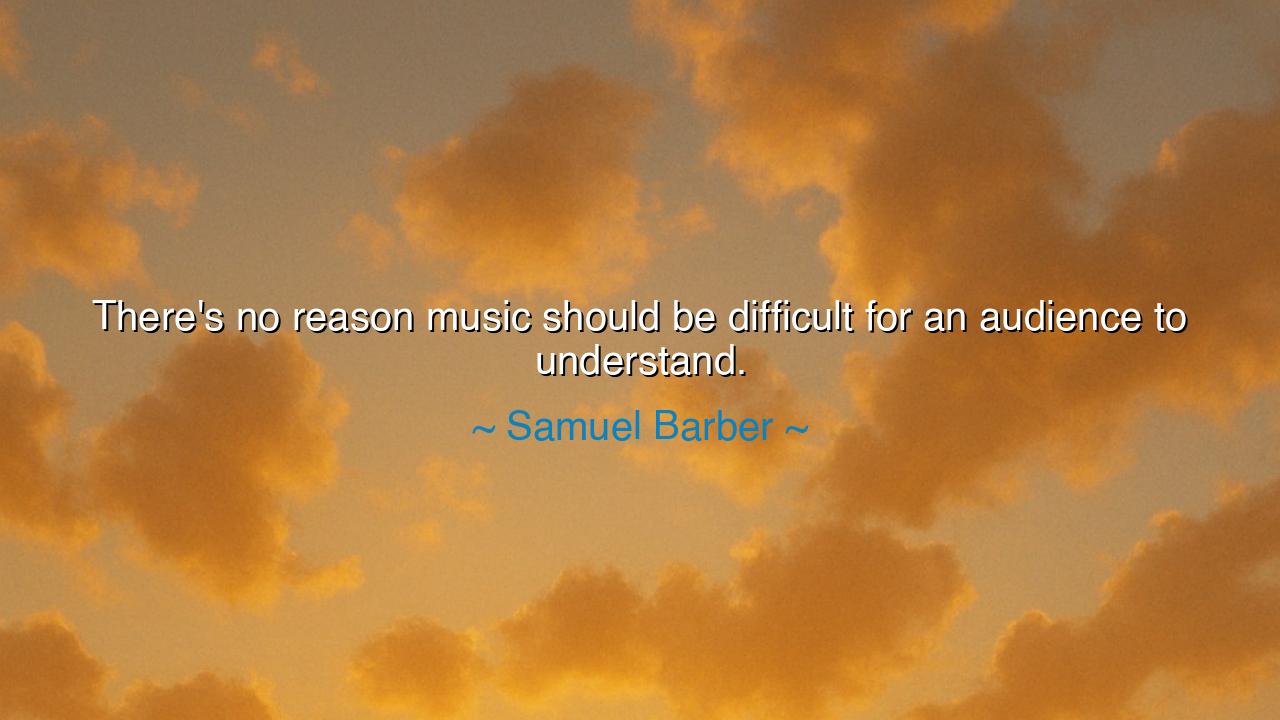
There's no reason music should be difficult for an audience to






Hear the words of Samuel Barber, composer of sorrow and beauty, who declared: “There’s no reason music should be difficult for an audience to understand.” In this simple yet profound statement lies a philosophy that defies vanity and honors the essence of art. For Barber, music was not meant to be a puzzle for scholars, nor a fortress guarded by the elite, but a river that all may drink from, a language that speaks directly to the heart without need of translation.
Barber’s own life gives rise to this wisdom. He was a man who, in an age when modern composers sought abstraction and complexity, instead turned toward melody, clarity, and emotional truth. His Adagio for Strings is perhaps the purest example: no labyrinthine structures, no intellectual riddles, only a slow rising line, mournful and human, that has carried nations through grief. Presidents, soldiers, and ordinary people alike have wept to it. This is the meaning of his words: that true music does not demand explanation, for it speaks in the ancient language of feeling.
Too often, art becomes a prison of pride. Composers and creators may build structures so complex that only a few initiates can enter. They seek greatness not in truth but in difficulty, as though obscurity were the crown of genius. Barber rejected this path. To him, the worth of music was in its ability to move the audience, to reach them where they lived, to comfort, to inspire, to remind them of their humanity. Why, then, should it be difficult? What virtue is there in making beauty inaccessible?
History offers us another mirror in Shakespeare. His plays were not written for universities or scholars alone, but for the common people who crowded the Globe Theatre. His words carried poetry, yes, but also humor, love, and passion that farmers and nobles alike could understand. He spoke to all, and for this reason, his works endure. Barber, like Shakespeare, saw that the highest art is not that which excludes, but that which embraces.
Yet Barber’s philosophy does not mean that music must be simple, only that it must be honest. Complexity for its own sake breeds confusion, but complexity born of genuine emotion can still be grasped by the heart. A symphony may be vast, a fugue intricate, yet if it carries within it truth, the audience will understand it. The human soul is more discerning than the intellect admits: it recognizes sincerity, even when it cannot name the structure.
The lesson, O seekers of wisdom, is clear: in whatever work you create, seek clarity of heart over cleverness of mind. Do not strive to confuse others into admiration. Strive instead to speak directly, whether in song, in word, in deed. Let your creations, like Barber’s music, carry truth that even the untrained ear, the unlettered heart, can receive. For the highest praise of art is not, “How clever,” but, “I felt it. It moved me. It was true.”
So, O children of tomorrow, take Barber’s teaching into your days. When you speak, when you write, when you work, ask not, “Will this impress?” but, “Will this reach?” Do not build walls around your gifts; build bridges. Let your song, whatever form it takes, be clear, open, and sincere. For there is indeed no reason for music—or any truth of the soul—to be difficult to understand. And in giving it freely, you will create works that endure, works that, like Barber’s Adagio, become eternal companions to the human heart.






AAdministratorAdministrator
Welcome, honored guests. Please leave a comment, we will respond soon